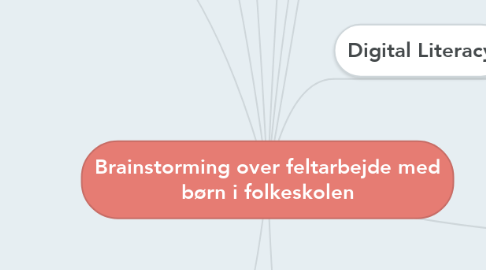
1. Participation observer
2. Thoughtfull Interaction Design
2.1. Future Workshops
2.1.1. A future workshop is a method for participatory social and organizational development that has been succesfully adapted to work-oriented design of digital artifacts
2.1.2. 1. The critique phase - brainstorming
2.1.3. 2. Fantasy phase - future
2.1.4. 3. The implementation phase - visions
2.2. Method 635
3. Gulløv
3.1. Antropologisk børneforskning: Det er en tilgang, der udforsker børns hverdagsliv, dvs. deres handlinger og fortolkninger i forhold til de positioner og handlemuligheder, de har og skaber sig i en given sammenhæng.
3.2. Antropologisk viden skabes på baggrund af tilstedeværelse i “felten"
3.3. Deltagerobservation står centralt i feltarbejde [21]
3.4. Kunsten er at deltage og forsøge at forstå de omstændigheder, der gør børnearbejde muligt og meningsfuldt for de mennesker, der er engageret i det.
3.5. Analysen må identificere generelle mønstre og rationaler, som det enkelte barns handlinger er udtryk for, men som beskriver sammenhænge, barnet næppe selv har erkendt. [30]
3.6. At analysere et rum indbefatter således afkodning af dominasforhold, positioner og status, for det er først gennem indblik i grundlæggende relationsparametre, at folks motiver og handlinger og fortolkninger giver mening. [136]
3.7. Et feltarbejde blandt børn kræver derfor opmærksomhed på de symbolske betydninger, som steder rummer. Vi har brugt flere begreber om steder (f.eks. sted, rum, lokalitet, kontekst) [148]
4. Ethnographic Field Method
4.1. Focus of observation
4.1.1. 1. Event focus
4.1.2. 2. Person focus
4.1.3. 3. Place focus
4.1.4. 4. Object focus
4.2. Interviewing
4.2.1. 1. Context
4.2.2. 2. Social situation
4.3. Video-taping
5. Doing ethnographic - Angrosino
5.1. Quality research
5.1.1. 1. By analyzing experiences of individuals or groups.
5.1.2. 2. By analyzing interactions and communications in the making
5.1.3. 3. By analyzing dicuments (text, images, film or music)
5.2. Conversations
5.2.1. Verbal data
5.2.2. Focus groups
5.2.3. Images
5.2.4. Interviews
5.3. 4 points:
5.3.1. A: The complete participant
5.3.2. B: The participant-as-observer
5.3.3. C: The observer-as-participant
5.3.4. D: The complete observer
5.4. 3 Skill areas
5.4.1. 1. Observation
5.4.1.1. .. is the act of perceiving the activities and interrelationships of people in the field setting through the five senses of the researcher
5.4.1.1.1. Side 40 - gode observationer
5.4.2. 2. Interviewing
5.4.2.1. .. interviewing is a proces of directing a conversation so as the collect information
5.4.2.1.1. probe - questioning
5.4.3. 3. Archival research
5.4.3.1. .. Arcival research is the analysis of materials that have been stored for resarch, service, and other purpose both official and unofficial
5.5. Sum
5.5.1. .. good etnographic research relies on a composite of observational, interview, and archival sources
6. Digital Competence
6.1. ICT skills
6.2. technology skills
6.3. information technology skills
6.4. 21. century skills
6.5. information literacy
6.6. digital literacy
6.6.1. digital media (Erstad)
6.6.1.1. 1. Basic skills
6.6.1.2. 2. Media as an object of analysis
6.6.1.3. 3. Knowledge building in subject-domains
6.6.1.4. 4. Learning strategies
6.6.1.5. 5. Digital bildung
6.7. digital skills
6.7.1. 1. Use tools interactively
6.7.2. 2. Interact in hetorogeneous groups
6.7.3. 3. Act autonomously
6.8. Digital competences consist:
6.8.1. 1. Technical skill to use digital technologies
6.8.2. 2. Abilities to use digital technologies in a meaningful way
6.8.3. 3. Ability to critically evaluate
6.8.4. 4. Motivation to participate in digital culture
7. Digital Literacy
7.1. What is Digital Literacy?
7.1.1. Digital Literacy is the ability to locate, organize, understand, evaluate, and create information using digital technology
7.2. Two tiers of digital literacy
7.2.1. 1. functional digital literacy
7.2.2. 2. critical digital literacy
7.3. Knowledge space (philosophy), by Lévy
7.3.1. Earth
7.3.2. Territorial
7.3.3. Commodidy
7.3.4. Knowledge
8. Lifeling Learning
8.1. 8 Key kompetencer
8.1.1. 1. Communication in mother tongue
8.1.2. 2. Communication in foreign languages
8.1.3. 3. Mathematical competences in science and technology
8.1.4. 4. Digital competence
8.1.5. 5. Learning to learn
8.1.6. 6. Social and civic competences
8.1.7. 7. Sense of initiative and entrepreneurship
8.1.8. 8. Cultural awareness and expression

